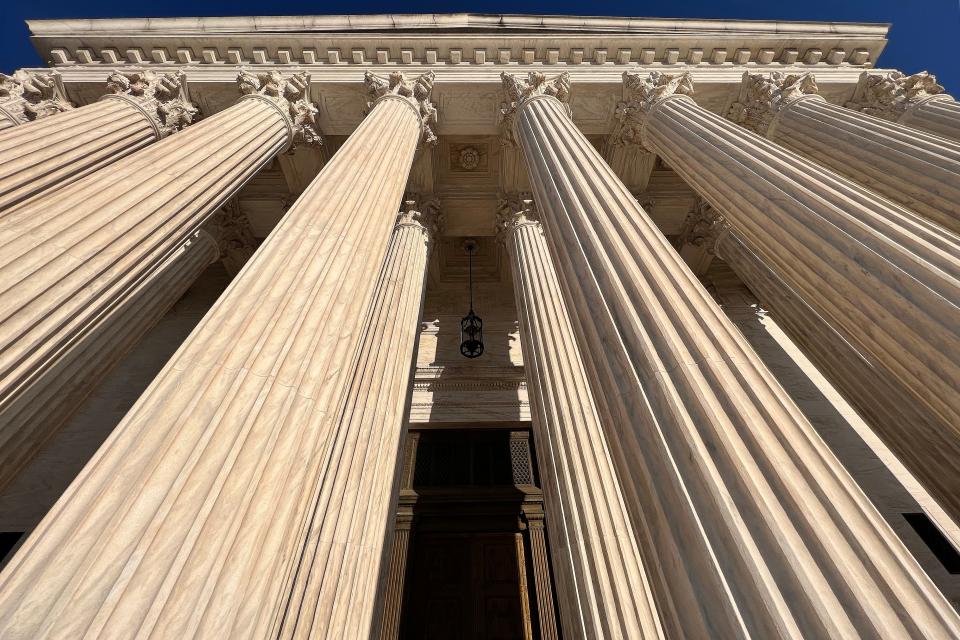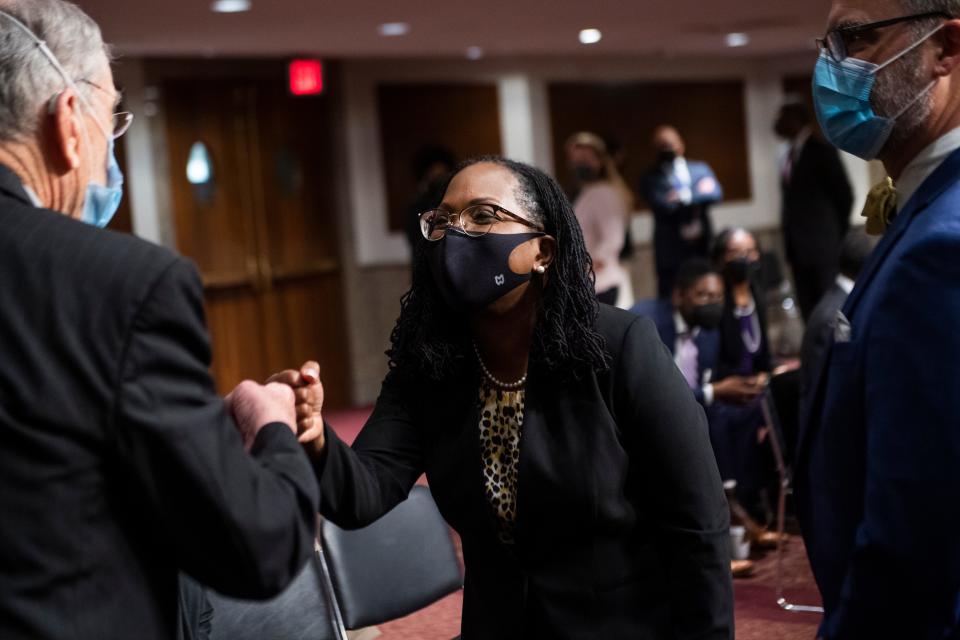Race, gender become factors in Supreme Court confirmation battle before Biden names his choice
- Oops!Something went wrong.Please try again later.
- Oops!Something went wrong.Please try again later.
- Oops!Something went wrong.Please try again later.
- Oops!Something went wrong.Please try again later.
WASHINGTON – The brewing battle over replacing Supreme Court Justice Stephen Breyer is becoming the latest flashpoint in the nation’s fraught relationship with race as Republicans and Democrats trade barbs over President Joe Biden's pledge to name a Black woman to the court for the first time in history.
A growing number of Republicans – including some in Congress – accuse Biden of elevating race and gender above other considerations. Many Democrats point out that GOP presidents faced little blowback for similar promises – and they are defending against what they see as an implicit criticism of adding diversity to the court.
The back-and-forth has thrust the issue of race into the mix as Round 1 in the brawl over Biden's nominee to the high court. It arrives at a time when the nation is still reeling from police killings of unarmed Black people, the unrest that followed in several cities and a potent debate over how schools should teach about racism.
"The idea that race just started to be an issue when Joe Biden said 'I'm going to appoint a Black woman to the court' is nonsense," said Niambi Carter, a political scientist at Howard University, noting the overwhelming number of white, male justices who have filled the court's bench throughout its history. "It's always been a racial institution."
Tone of Supreme Court to shift?: Some predict Justice Breyer's exit will deepen polarization on Supreme Court
'Overdue': Biden reiterates vow to name first Black woman to Supreme Court
Biden first raised the idea of picking a Black woman for the Supreme Court days before the 2020 presidential primary in South Carolina. The former vice president had performed poorly in other early nominating contests. His win in South Carolina – a state with a large share of African American voters – has been seen as key to his comeback.

"I'm looking forward to making sure there's a Black woman on the Supreme Court, to make sure we in fact get every representation," he said to applause at the time.
Some of the criticism aimed at Biden has been based on the idea that, even if he believes the nation is "overdue" for a Black woman justice, the announcement appeared to be at least in part a political calculation. Sen. Susan Collins, R-Maine, told ABC last month that Biden's handling of the nomination was "clumsy at best" because it "adds to the further perception that the court is a political institution."
The president reiterated the promise after Breyer formally announced his retirement. Biden said he would pick someone with "extraordinary qualifications, character, experience, and integrity" and added that person "will be the first Black woman ever nominated to the United States Supreme Court." Out of 115 justices who have served on the Supreme Court since 1789, all but seven have been white men.
That works out to 94% of the high court's members being white men.
Some observers see a disturbing undercurrent in the language coming from Republican critics, including an implication that a Black woman might not be the most qualified nominee that Biden could choose. Some of the remarks – such as those comparing Biden’s pledge to affirmative action – overtly suggest Biden’s candidate will be nominated only because of race and gender.
"It is obvious that for there not to have been a Black woman for all of these years, that they're being overlooked – that their voices and qualifications have not been given the same shake," said Leslie Davis, CEO of the National Association of Minority & Women Owned Law Firms. "To me, that makes it all the more relevant for him to be thoughtful and intentional about adding a voice that has yet to be a part of that body.
"To suggest that he could not intentionally look for and find a Black woman who would be a great value-add to that court is to devalue Black women. If it were a white guy, they would not be saying Biden could not find somebody who was going to be qualified."
The court includes two white women, Associate Justices Elena Kagan and Amy Coney Barrett; a Hispanic woman, Associate Justice Sonia Sotomayor; and a Black man, Associate Justice Clarence Thomas. If the fight over race and gender sounds familiar, it may be because those debates have played into past confirmation battles in which nominees were not white men.
Sotomayor, the court's first and only Hispanic, was grilled by Republicans during her 2009 confirmation for asserting in speeches that a "wise Latina woman" might be able to reach a "better" outcome in a case than a white man. President George H.W. Bush fought off criticism that he embraced a "quota" by naming Thomas, the current court's only African American, for the seat long held by Associate Justice Thurgood Marshall, who was its first African American justice.
"I don't feel there's a quota; I don't feel that I had to nominate a Black American at this time for the court," Bush said at the time. "I expressed my respect for the ground that Mr. Justice Marshall plowed, but I don't feel there should be a Black seat on the court."

Swift blowback
GOP backlash lit up conservative Twitter, then snowballed on Fox News and among some Republicans, including a few who may be contemplating presidential campaigns in 2024.
Former U.N. Ambassador Nikki Haley tweeted that Biden should choose a nominee without a "race/gender litmus test." Sen. Roger Wicker, R-Miss., described Biden's move as "affirmative racial discrimination" and a "sort of quota." Sen. Ted Cruz, R-Texas and a member of the Senate Judiciary Committee, called the pledge "offensive." Sen. Pat Toomey, R-Pa., said that "the president should pick the most qualified person for the job, regardless of race or gender."
Days after Breyer announced he would step down from the high court after nearly 30 years, an ABC News/Ipsos poll found that 76% of Americans wanted the president to "consider all possible nominees," compared with 23% who said he should "consider only nominees who are Black women, as he has pledged to do." But that poll has since drawn criticism in part over how its questions were worded.
"The question is set up in a way that only one answer is socially acceptable," said Cornell Belcher, a Democratic pollster who worked on former President Barack Obama's campaigns. "Of course every qualified person should be considered."
Belcher pushed back on the GOP response.
"It is the fanning and fueling of tribalism," he said. "The problem with this is that it plays right into the politics of resentment and reverse discrimination."
Most of the candidates under consideration have resumes similar to previous Supreme Court nominees. Last summer, the Senate confirmed one of them, Judge Ketanji Brown Jackson, for a seat on the U.S. Court of Appeals for the D.C. Circuit. Jackson, a Harvard Law grad who clerked for Breyer, was supported for confirmation by all Democrats and three Republicans. Another candidate, California Supreme Court Associate Justice Leondra Kruger, served in two presidential administrations before her nomination to her state's highest court. Kruger is a Yale Law graduate who clerked for Associate Justice John Paul Stevens and argued a dozen cases before the high court.
Sen. Lindsey Graham, R-S.C., told CBS News last month that "affirmative action is picking somebody not as well-qualified for past wrongs" and that at least one of the candidates Biden is considering, U.S. District Judge J. Michelle Childs of South Carolina, "is incredibly qualified."
"Put me in the camp of making sure the court and other institutions look like America," Graham said.
Short list: Who is Ketanji Brown Jackson? For starters, she once clerked for Breyer
Diversity and the Supreme Court: Biden poised to double the number of Black women appeals court judges
To be nominated as the first Black woman – or the first at anything at the Supreme Court, "you've got to be good – start-to-finish good and better than most," Sen. Dick Durbin, D-Ill., chairman of the Senate Judiciary Committee, told reporters this week. He said the Biden administration has selected a diverse set of candidates for lower courts, some of them more controversial than others.
Asked if he sees a pattern in Biden's candidates who have received more scrutiny, Durbin indicated he did: "assertive women of color."

Reagan vs. Trump vs. Biden
Biden is far from the only president to promise a nominee from a political constituency.
During the 1980 presidential campaign, then-Gov. Ronald Reagan of California announced his commitment "to appoint a woman to the Supreme Court." Polls showed incumbent President Jimmy Carter with an advantage in at least one battleground state among women voters. A year later, Reagan nominated the first woman to the Supreme Court: Associate Justice Sandra Day O'Connor.
In the months leading up to the 2020 election, President Donald Trump was emphatic about nominating a woman to the Supreme Court to succeed Associate Justice Ruth Bader Ginsburg, who died in September that year. Trump nominated Barrett, who was confirmed in less than a month.
"I will be putting forth a nominee next week," Trump told supporters at an airport rally in North Carolina at the time. "It will be a woman."
Abortion: Justice Breyer had a big impact on abortion. That legacy is in jeopardy
'Bounty': States weigh Texas-style enforcement for guns, schools after abortion ruling
White House aides and other Democrats pointed to those statements to undermine the GOP criticism. Jonathan Turley, a professor at George Washington University Law School, argued those comparisons are misguided. Other presidents, Turley said, considered a wide range of candidates.
"Those presidents all had short lists that were diverse even though they wanted to pick a woman or an African American," Turley said. "They applied a preferential rather than exclusionary rule, a preference that has been allowed by the court itself in past cases."
Giving preference to diversity is not a new idea, Turley said.
"What is new is the categorical promise not to consider anyone else due to their race or gender," he said. "That may seem a subtle difference to many, but it is precisely the difference that has motivated thousands of lawsuits."
The Supreme Court will dig into the issue of racial preference in a different context later this year: college admissions. The justices announced last month that they will decide whether the use of race as one of several factors in the admissions process at Harvard University and the University of North Carolina violates civil rights laws or the Constitution.
Plaintiffs in that case are asking the 6-3 conservative court to overturn a 2003 decision in which a majority of the justices upheld the University of Michigan law school's "narrowly tailored" use of racial preferences as a means of achieving diversity. That opinion, written by O'Connor for a 5-4 majority, predicted that by the year 2028, the "use of racial preferences will no longer be necessary" to achieve a diverse student body.
Presidents, by contrast, have broad latitude under the Constitution to nominate whoever they please to the Supreme Court. Senate Democrats will be able to confirm Biden's nominee with a simple majority. Biden has said he will name a nominee by the end of February, which is Black History Month, and Democrats hope to move quickly to confirm her.
It's uncertain how much some of the debate over race and gender taking place will play into the confirmation hearing this year or whether it could affect perceptions of whoever is confirmed to the Supreme Court.
Bruce Peabody, a political scientist at Fairleigh Dickinson University who has studied the interplay between politics and the courts, said he believes there is a pattern of women and minority nominees for the Supreme Court receiving greater scrutiny, even if that's not always the case. That can have long-term implications.
"It does, in some of those cases, feel like a double standard and extra scrutiny for some of these nominees," Peabody said. "The nominees’ backgrounds, the press that they get and how the president positions them have a big impact on kind of that path of how they're regarded and the criticism we see" once they're confirmed to the court.
This article originally appeared on USA TODAY: Race, gender factors in brewing Supreme Court confirmation fight

